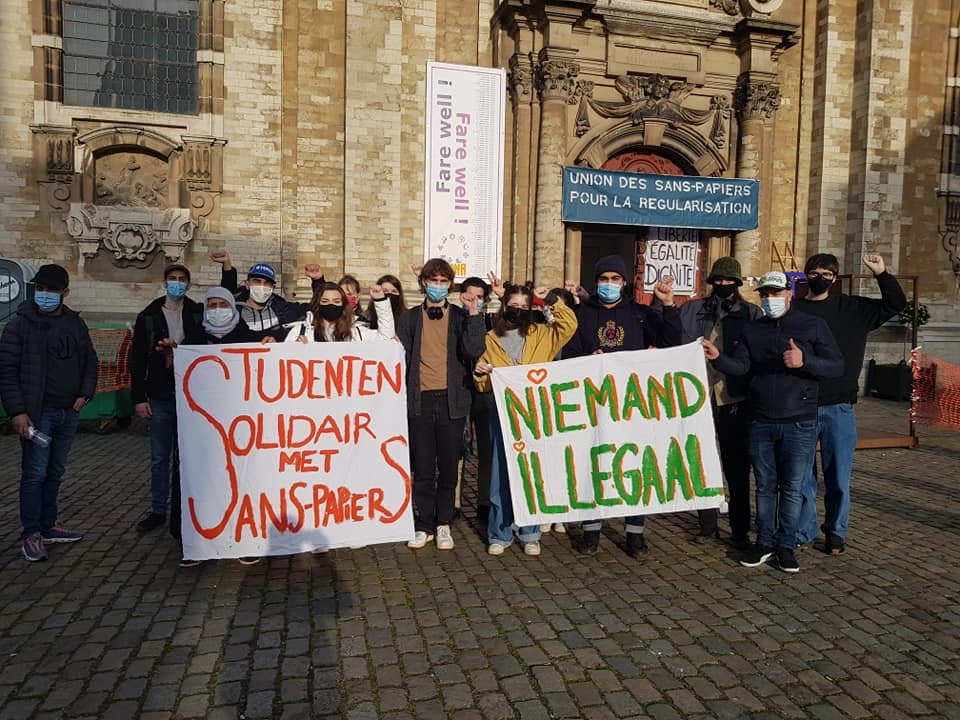Reportage
Trapped ‘sans-papiers’ in the heart of Brussels
Driven to the edge and even more precarious since the pandemic, 150 people, mostly families, have occupied one of the symbolic places of the historic center of Brussels.

“We want to live with dignity and legality” is the cry of the sans-papiers, migrants waiting for regularization who at the end of January decided to occupy the Beguinage church in the central Sainte-Catherine square, in the heart of the city of Brussels. Several collectives of sans-papiers have decided to take action to demand more support from public authorities.
They have been driven to the edge by the living conditions made even more precarious by the COVID-19 health crisis. They are 150 people, mostly families, who have occupied, with tents, mattresses and sleeping bags, one of the symbolic places of the historic center of Brussels. “Our goal is to attract the attention of the public authorities,” and in particular of the Minister-President of the Brussels-Capital Region, Rudi Vervoort, of the French-speaking Socialist Party, and of the Secretary of State for Political Asylum and Immigration, Sammy Madhi, of the Flemish Christian Democratic CD&V Party (a position that in the previous legislature was occupied by the energetic Theo Francken, Flemish nationalist, known in the international press for his openly anti-immigrant initiatives).
Now, there are four occupations underway in the city of Brussels, involving about 500 people, a quarter of whom are minors. The occupation of the Beguinage church in the central Sainte-Catherine square is only the latest in a series of such events. About a hundred people occupied a department of the French-speaking Ulb University, and another hundred occupied the Flemish Vvub University Vat the beginning of the year. Just before Christmas, 80 people, migrants and homeless persons, occupied the old Antoine Depage clinic in the district-commune of Saint Gilles.
“What we hope is to de-politicize the migration issue and bring it back to its true nature, that is, a humanitarian issue,” is the hope of Abdel-hak Zaini, cultural mediator for the association Samenlevingsopbouw, which has long been committed to supporting the actions of the collectives of sans-papiers. “These people live in a permanent precarious situation, first of all an administrative precariousness, since we are talking about so-called irregular people who have been living in Belgium for many years, with children born on Belgian soil and regularly educated; then, health precariousness and job precariousness, made even more critical with the arrival of Covid,” Abdel-hak Zaini complains.
The initiative has received the support of the pastor of the Church of the Beguinage, Father Daniel, on the condition that the sanitary rules against the spread by Covid-19 are respected. “We are talking about people who today are in great difficulty, who worked mainly in the restaurant industry and who today are living in an extremely problematic economic situation,” was the comment of the parish priest who hopes in a decisive intervention by politics.
“It is clear that the migration issue is not a priority for this government,” was the bitter comment of Abdelhaz Zaini, who hopes for the introduction of a legislative reform (currently introduced in the federal parliament by the opposition) and the establishment of a parliamentary committee of inquiry able to take a position on the “lack of regularization” in recent years. “We were already confined well before the arrival of Covid, and now we are even more so, we are clearly forgotten and ignored by the institutions, and our actions aim to awaken consciences,” said Sofiane, a migrant and spokesperson for the collective of sans-papiers in Brussels. “We only ask for clear criteria and procedures, because today making an application for regularization is a real ordeal,” added Sofiane.
For his part, the Secretary of State for Political Asylum and Immigration, Sammy Madhi, has repeatedly stated that the naturalization procedure is clear, excluding the possibility of collective regularization, as mentioned in the local press. “I prefer to be tough and clear, without risking giving false hope. Regularization in itself is an exceptional procedure; then, there are particular situations that must be examined individually,” Madhi told the French-speaking radio station La Première, referring to the recent naturalization of the parents of Mawda, the 4-year-old girl who was killed in 2018 by a gunshot fired by a police officer during a control. According to the NGO Samenlevingsopbouw, there are between 100 and 150,000 migrants and refugees waiting for regularization in Belgium.
The demands from the collective of sans-papiers for more attention from the authorities comes against a backdrop of rising poverty in Belgium, as a direct corollary of the pandemic and coronavirus confinement measures. According to data from the Belgian food bank federation, which is representative of all associations that prepare food parcels for the homeless or those in economic hardship, demand has increased by 15% during 2020.
It is mainly about “people who had a precarious job and have lost it, and who are in a situation where they cannot benefit from the government’s support measures,” explained the NGO’s president, Jef Mottar, who did not hide his concern in the local press: “In these weeks, we are only able to cover 75% of the requests, which means that we are not able to meet a quarter of the requests for help.”
Originally published at https://ilmanifesto.it/i-confinati-di-bruxelles/ on 2021-03-12
